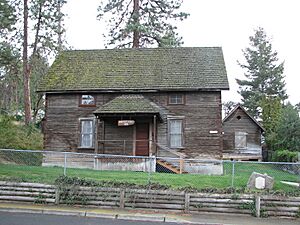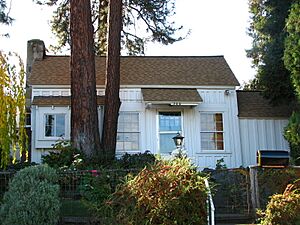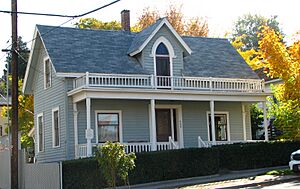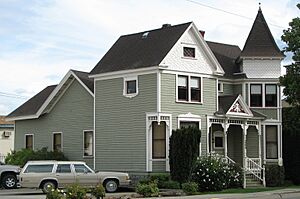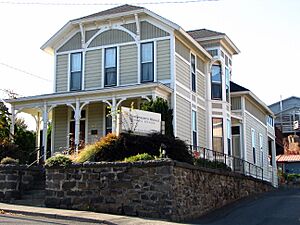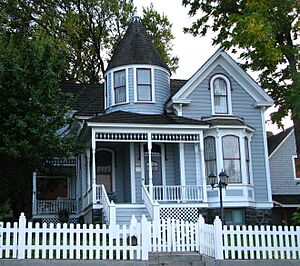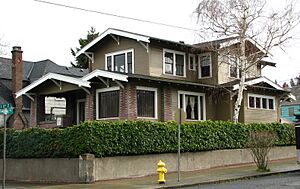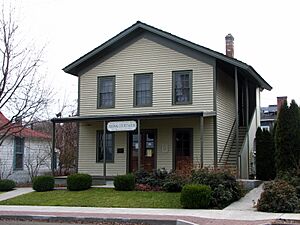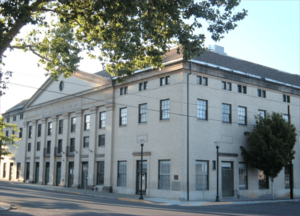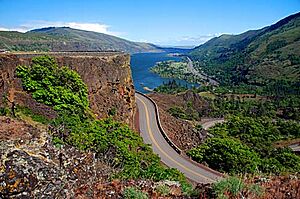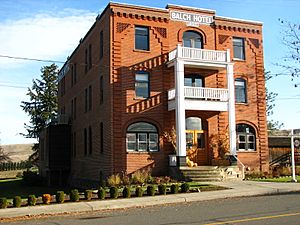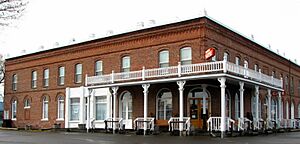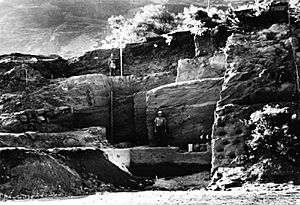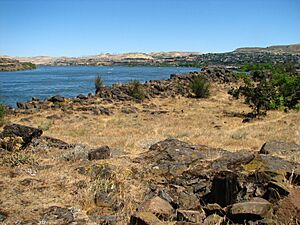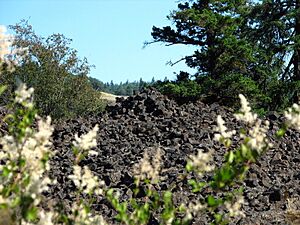National Register of Historic Places listings in Wasco County, Oregon facts for kids
Wasco County, Oregon, is a place rich in history, and many of its important buildings and sites are listed on the National Register of Historic Places. This special list helps protect places that are important to the history of the United States. These sites in Wasco County tell stories about pioneers, early towns, and the lives of people who shaped this part of Oregon.
Contents
Historic Homes and Early Life
Many old houses in Wasco County have amazing stories. They show us how people lived long ago and the different styles of homes they built.
Lewis Anderson House, Barn and Granary
Imagine living in a house from the 1890s! The Lewis Anderson House, Barn and Granary is a group of buildings that show how Swedish-American families built their homes. It was moved in 1972 to keep it safe and is now a museum where you can learn about life back then.
Malcolm A. Moody House
The Malcolm A. Moody House might be the oldest building still standing in The Dalles, built around 1850! It was first used by soldiers at Fort Dalles. Later, a mayor and U.S. Representative named Malcolm A. Moody lived there. Today, it's also a museum, giving us a peek into the past.
Orlando Humason House
The Orlando Humason House was home to a very important person known as the "Father of Wasco County." Orlando Humason lived here from 1860 until he passed away in 1875. He helped create Wasco County and the city of The Dalles. He also worked hard to get the Cascade Locks built, which were important for river travel.
John L. Thompson House
The John L. Thompson House started as a simple home in 1889. But in 1897, it got a big makeover and became a beautiful Queen Anne-style house. This house shows how buildings in frontier towns changed over time.
Edward French House
The Edward French House was built around 1865 and later updated in the Italianate style around 1900. The French family, including Edward, were important bankers and business owners in The Dalles for many years.
Hugh Glenn House
The Hugh Glenn House is another beautiful Queen Anne-style home in The Dalles. Hugh Glenn, a well-known architect and businessman, designed and built this house around 1882 and lived there until 1927.
John and Murta Van Dellen House
Built in 1920, the John and Murta Van Dellen House is a great example of a California bungalow in The Dalles. John Van Dellen owned a successful lumber yard, so his house was built with the best local materials and excellent craftsmanship.
Important Community Buildings
These buildings played a big role in the daily lives of people in Wasco County, from learning to governing.
Antelope School
The Antelope School is a historic school building in Antelope, Oregon. Schools like this were central to small communities, providing education for children in the area.
First Wasco County Courthouse
The First Wasco County Courthouse is one of only two courthouses left from before Oregon became a state! It served Wasco County from 1859 to 1882. After that, it was The Dalles city hall until 1907. This building has been moved several times to keep it safe.
St. Peter's Roman Catholic Church
The original Catholic church in The Dalles was founded in 1848. By 1890, it needed a bigger building. This beautiful St. Peter's Roman Catholic Church was built in 1898. It was considered the finest Catholic church in Oregon when it was finished. Today, the 1898 building is a museum.
The Dalles Carnegie Library
The The Dalles Carnegie Library was built in 1910 with money from a special grant. It was the first public library in The Dalles and helped create a group of important civic buildings. After the library moved in 1966, this building became an arts center.
The Dalles Civic Auditorium
The The Dalles Civic Auditorium was built in 1921 to honor veterans of World War I. It was one of the first community centers in Oregon to offer many different activities. It had an auditorium, a gym, a ballroom, and even a swimming pool for a short time!
Sites of Early Travel and Trade
Wasco County was an important place for travelers and trade, especially because of its location near the Columbia River.
Barlow Road
The Barlow Road was built in 1846 and was the first overland road for wagons to cross Mount Hood. It gave pioneers on the Oregon Trail a safer way to travel instead of the dangerous raft trip down the Columbia River.
Columbia River Highway Historic District
Built between 1913 and 1922, the Columbia River Highway Historic District was the first scenic highway in the United States! It was designed so visitors could easily see the beautiful Columbia River Gorge. It was also a big step forward in road engineering.
Balch Hotel
The Balch Hotel was built in 1908 to serve travelers who were switching between the railroad and stagecoaches. It had modern features and was a busy place where salesmen often stayed, making it a center of the Dufur community.
Columbia Southern Hotel
The Columbia Southern Hotel was built in Shaniko between 1900 and 1902 by the Columbia Southern Railway. It was the most impressive building in Shaniko and was the heart of the community when the local wool industry was booming. Besides lodging, it was a saloon, bank, stagecoach stop, and a place for dances and gatherings.
Maupin Section Foreman's House
This house reminds us of the "Last Great Railroad War" when two powerful transport leaders raced to build railroad routes. The Maupin Section Foreman's House was built in 1910 to house the local track maintenance foreman for the Union Pacific Railroad.
Native American Heritage Sites
Wasco County is home to very old sites that tell us about the lives of Native American peoples who lived here for thousands of years.
Fivemile Rapids Site
The Fivemile Rapids Site is an archaeological site that has records of human life going back at least 9,000 years! It shows a nearly continuous history of people living there until 1820. It also has some of the earliest proof of fishing as a way of life.
Rock Fort Campsite
The famous Lewis and Clark Expedition camped at the Rock Fort Campsite in 1805. This natural riverside fort was where they first met and traded with the Chinookan-speaking peoples of the lower Columbia River.
Indian Shaker Church and Gulick Homestead
The Indian Shaker Church and Gulick Homestead is the only remaining 19th-century fishing homestead in Oregon. Henry Gulick built this group of buildings in the 1890s. He included a church for his wife, Harriet, who was a member of the Wasco people.
Mosier Mounds Complex
The Mosier Mounds Complex is a collection of stone walls, pits, and mounds. It's the largest and most complex of many Native American sites in this area. It was built before Europeans arrived and shows how Native Americans lived and used the land.
Images for kids


